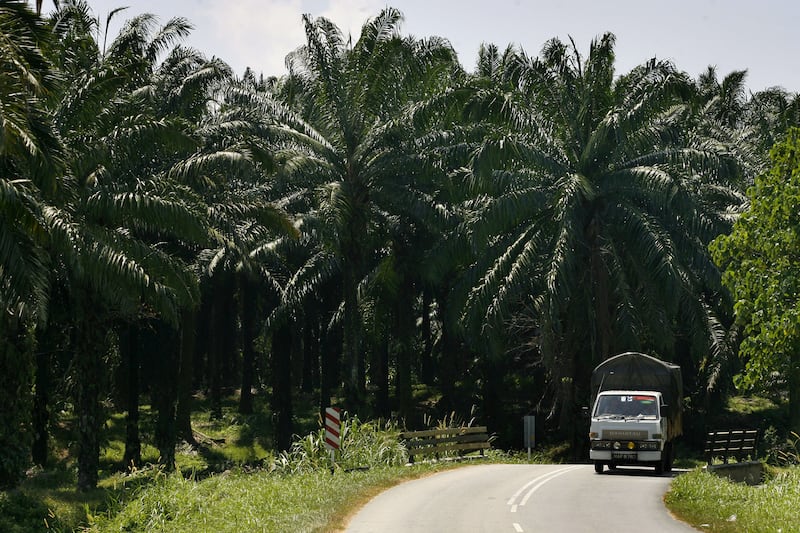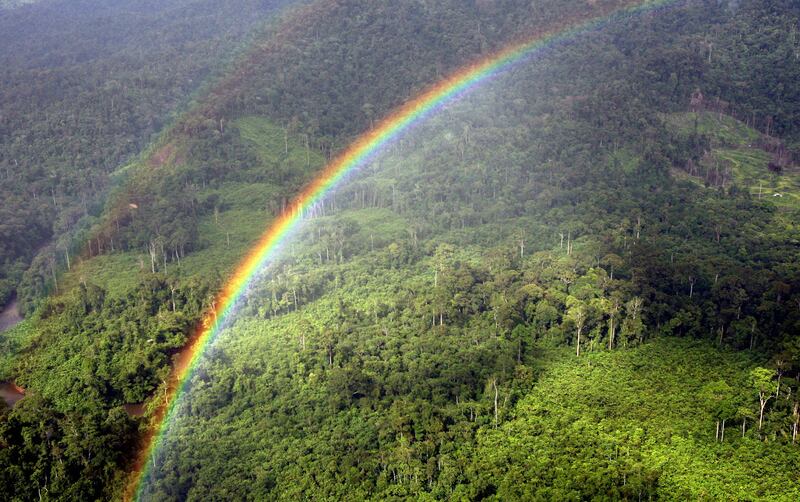Forest areas that together are 100 times the size of Kuala Lumpur have been earmarked for palm oil and timber plantations in Malaysia, an environmental watchdog group has estimated.
In a study released this week titled “State of the Malaysian Rainforest 2023,” climate group RimbaWatch says it based its “landmark” deforestation prediction on a review of public documents such as forestry maps, project descriptions, land activity and real-estate alerts.
“From our analysis, we estimate that a further 2,346,601 hectares of forests in Malaysia have been earmarked for deforestation,” the study said.
“The study found that between 2017 and 2021, the entities driving deforestation projects the most were timber plantations at 41.6%, followed by palm oil plantations at 15.5%.”
Forestry authorities put timber and palm plantations under the categories of “forest plantations” and “forest covers,” the study said. But such plantations actually involve deforestation and “conversion of forest reserve lands into industrial monoculture plantations for commodities such as rubber and acacia.”
This is called “greenwashing,” because such a categorization misleads the public about the true nature of these projects.
Monoculture farming refers to the planting of one type of crop. Critics say this type of farming causes a loss of biodiversity, depletes water and saps the soil of nutrients, among other ill-effects.

According to Malaysia’s Ministry of Natural Resources, Environment and Climate Change, the country’s forest cover was 55.52% of its land area in 2017. If the Southeast Asian nation ends up losing the estimated 2.4 million hectares earmarked for deforestation, forest cover will shrink to 47.35%, RimbaWatch said.
Malaysia would then end up violating its domestic and international climate obligation made at the Earth Summit in 1992, under which it committed to maintain 50% of its land cover as forest, the study said.
At the 2021 United Nations Climate Change Conference, Malaysia pledged to stop deforestation by 2030 and limit methane emissions. The country also pledged carbon neutrality by 2050.
BenarNews reached out to Nik Nazmi Nik Ahmad, minister of energy and natural resources, to confirm RimbaWatch data on how much area is earmarked for deforestation and enquire about Malaysia’s climate commitment on forest cover.
The minister replied by email with a statement that neither confirmed nor denied RimbaWatch data.
“We appreciate efforts by civil society to increase awareness on the issue of forest loss,” the statement issued Wednesday said.
“However, we also note that the findings are estimations, and we are unable to respond to the findings without fully reviewing and verifying the study.”

Such explanations don’t cut ice with environmentalist Ahmad Ismail, who said the government needed to be transparent and ensure environmental data is accessible.
“Because we want accurate data to refer to … so that there is no debate between the public including NGOs,” he told BenarNews.
“Also, the government should identify all protected areas and borders so that the public, especially NGOs, can help to protect the areas. With new technologies such as satellite images, and drones, we can assess legal and illegal deforestation.”
Meanwhile, environmental group Friends of the Earth Malaysia said the country does not have effective policies and laws to integrate the rights of indigenous and local communities in forestry management.
“For decades, a large bulk of logging, monoculture plantation and other destructive activities causing deforestation have been taking place in our indigenous customary territories,” S. Mageswari, the group’s honorary secretary, told BenarNews.
She said that since the beginning of the 1990s, monoculture plantation licenses, mostly for the cultivation of timber and oil palm trees, began to be issued in these logged-over forests.
“This failure to manage forests sustainably and protect indigenous customary land rights over the last four decades has led to a significant increase in deforestation,” she said.
